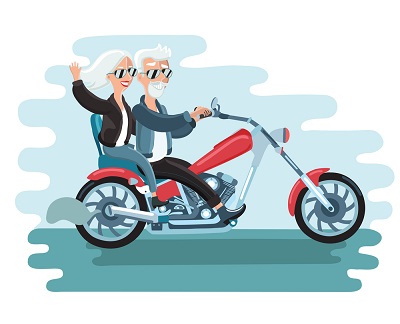 If you happened to attend your high school reunion, you probably noticed just how differently your old classmates had aged. The prom king was sporting a receding hairline and a belly while the prom queen’s hair had lost its luster.
If you happened to attend your high school reunion, you probably noticed just how differently your old classmates had aged. The prom king was sporting a receding hairline and a belly while the prom queen’s hair had lost its luster.
You probably dismissed a lot of it as lifestyle choices and perhaps even life experiences they may have gone through.
While that indeed plays a major role, a recent study (on the quantification of biological aging in young adults, Belsky, et al, found that we really do age at different rates, for a whole host of reasons.
.
The Study
What makes this 2015 study different from other studies on aging is that rather than looking at aging rates in the elderly their participants were young adults. There were around 1,000 participants, aged 28, and researchers discovered their rate of aging varied wildly. Their biological age ran the gamut from 30 right up to 60 despite the fact that they were all 38 years old chronologically speaking.
Each of the participants was young and healthy rather than taking elderly people and tracking back the habits of those who weren’t as healthy. The researchers looked at 18 different parameters, which including dental health, cognitive function, and organ function.
They took this data twice, twelve years prior and then six years prior. Those who looked older than their counterparts were biologically older. Not only that but they scored much lower on the tests for balance, strength, and IQ.
It was also just how widely the aging varied, with some extremes being visible. At one end, three of the participants were not aging at all, whereas at the other end of the spectrum those participants were aging three physiological years for every chronological year.
It’s More than Genetics
Some of this can be chalked up to genetics, as there are families who age more slowly biologically speaking. Everyone knows a family where the mother and daughter could be sisters because the elder family member just hasn’t aged.
However, this only accounts for around 20% of how you age; the wider roles are played by lifestyle factors and the environment.
If you are a smoker, you can expect to experience premature aging at a quicker rate. If you are a couch potato who only eats chips and dip for dinner then your waistline will grow out of control and it will accelerate the aging process rather dramatically.
In fact, it goes beyond those types of choices and encompasses exposure to sunlight and UV rays as well as the amount of stress you tend to experience.
The most effective ways to combat aging is exercising regularly, eating a healthy diet, getting a good night’s sleep, and learning how to effectively manage your stress levels so they don’t have an impact on the other aspects of your life.
Positive Mental Attitude
The earlier you start the better; however, it is truly never too late to change your lifestyle to combat the effects of aging. While you should keep your family history in mind when focusing on specific preventative treatments, you must also consider your actions and how they may be fueling your aging process.
If you are a smoker start cutting back now and speak to your doctor about how best to ensure you quit for good. You can change your diet and exercise habits, which will support healthy sleeping patterns.
You should also cut back on your alcohol intake; this doesn’t just contribute to liver disease and heart problems, but also to weight gain, which has its own relationship with premature aging.






